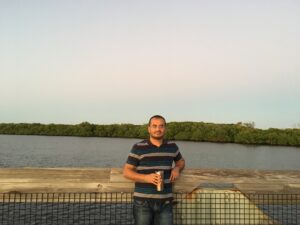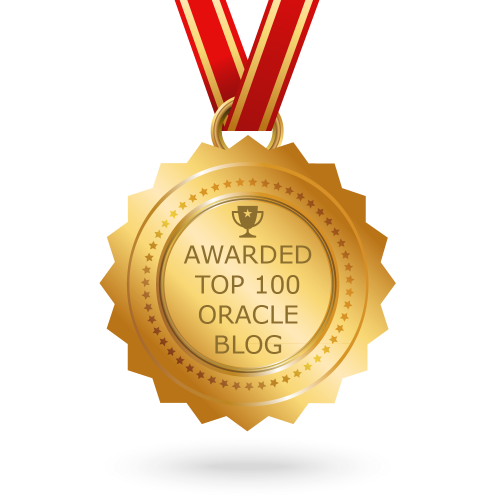In this topic, I will discuss how to manage ASM in Oracle including following items.
- Important queries to manage or monitor ASM.
- Create ASM DISKGROUP
- Manage Existing Diskgroup (add / drop disk)
- Tuning I/O Performance in Oracle ASM
- Mapping ASM Disk with Physical DISK
ASM REDUNDANCY Level:
NORMAL REDUNDANCY– Two-way mirroring, requiring two failure groups.HIGH REDUNDANCY– Three-way mirroring, requiring three failure groups.EXTERNAL REDUNDANCY– In this configuration there are only primary extents and no mirrored extents.
1. Important queries to manager or monitor ASM.
Use the following query to check the list of ASM DISKs are available in Oracle ASM Instance:
[oracle@racdr1 ~]$ . oraenv ORACLE_SID = [+ASM1] ? The Oracle base remains unchanged with value /u01/app/oracle [oracle@racdr1 ~]$ sqlplus / as sysasm
SQL> set linesize 1000 SQL> col PATH for A30 SQL> Select dg.Name DISKGROUP_NAME, d.NAME DISK_NAME, d.PATH, d.TOTAL_MB, d.FREE_MB, d.MOUNT_STATUS, d.HEADER_STATUS,d.MODE_STATUS,d.STATE FROM V$ASM_DISK d, V$ASM_DISKGROUP dg WHERE dg.GROUP_NUMBER = d.GROUP_NUMBER ORDER BY dg.GROUP_NUMBER, d.NAME; DISKGROUP_NAME DISK_NAME PATH TOTAL_MB FREE_MB MOUNT_S HEADER_STATU MODE_ST STATE ------------------------------ ------------------------------ ------------------------------ ---------- ---------- ------- ------------ ------- -------- FRA DATADISK1 ORCL:DATADISK1 5114 5064 CACHED MEMBER ONLINE NORMAL FRA DATADISK2 ORCL:DATADISK2 5114 5065 CACHED MEMBER ONLINE NORMAL DATA DATADISK3 ORCL:DATADISK3 5114 2130 CACHED MEMBER ONLINE NORMAL DATA DATADISK4 ORCL:DATADISK4 5114 2130 CACHED MEMBER ONLINE NORMAL DATA01 DATADISK8 ORCL:DATADISK8 5114 4807 CACHED MEMBER ONLINE NORMAL OCR OCRDISK1 ORCL:OCRDISK1 3067 1552 CACHED MEMBER ONLINE NORMAL OCR OCRDISK2 ORCL:OCRDISK2 3067 1585 CACHED MEMBER ONLINE NORMAL OCR OCRDISK3 ORCL:OCRDISK3 3067 1576 CACHED MEMBER ONLINE NORMAL 10 rows selected.
Use following query to show the List of ASM DISKGroup are associated with a Database:
SQL> SELECT dg.name AS diskgroup, SUBSTR(c.instance_name,1,12) AS instance, SUBSTR(c.db_name,1,12) AS dbname FROM V$ASM_DISKGROUP dg, V$ASM_CLIENT c WHERE dg.group_number = c.group_number; DISKGROUP INSTANCE DBNAME ------------------------------ ------------ -------- DATA ORCL1 ORCL OCR +ASM1 +ASM OCR -MGMTDB _mgmtdb
Create a Tablespcae with new ASM DISKGroup
SQL> Create Tablespace tbs_test datafile '+DATA01' size 50M; Tablespace created.
Again run the query to check DISKGROUP List for ORCL database:
SQL> SELECT dg.name AS diskgroup, SUBSTR(c.instance_name,1,12) AS instance, SUBSTR(c.db_name,1,12) AS dbname FROM V$ASM_DISKGROUP dg, V$ASM_CLIENT c WHERE dg.group_number = c.group_number; DISKGROUP INSTANCE DBNAME ------------------------------ ------------ -------- DATA ORCL1 ORCL DATA01 ORCL1 ORCL OCR -MGMTDB _mgmtdb OCR +ASM1 +ASM
2. Create ASM DISKGROUP
ASM supported version: (Doc ID 337737.1)
| Clusterware | ASM | DB | Certified |
| 19c | 19c | 19c, 18c, 12.2, 12.1, 11.2 | Y |
| 18c | 18c | 18c, 12.2, 12.1, 11,2 | Y |
| 12.2 | 12.2 | 12.2, 12.1, 11.2 | Y |
| 12.1 | 12.1 | 12.1, 11.2, 11.2, 10.2 | Y |
| 11.2 | 11.2 | 11.2, 11.1, 10.2 | Y |
Below attributes value may set during ASM Diskgroup creation.
- AU_SIZE: Specifies the size of the allocation unit for the disk group.You can view the value of the
AU_SIZEdisk group attribute in theALLOCATION_UNIT_SIZEcolumn of theV$ASM_DISKGROUPview. COMPATIBLE.ASM: Determines the minimum software version for any Oracle ASM instance that uses a disk group.COMPATIBLE.RDBMS: Determines the minimum software version for any database instance that uses a disk group.COMPATIBLE.ADVM: Determines whether the disk group can contain Oracle ADVM volumes.
[oracle@racdr1 ~]$ echo $ORACLE_HOME
/u01/app/12.1.0/grid
[oracle@racdr1 ~]$ echo $ORACLE_SID
+ASM1
[oracle@racdr1 ~]$ sqlplus / as sysasm
SQL> CREATE DISKGROUP DATA01 NORMAL REDUNDANCY
FAILGROUP controller1 DISK
'ORCL:DATADISK6' NAME DISK6
FAILGROUP controller2 DISK
'ORCL:DATADISK7' NAME DISK7
ATTRIBUTE 'au_size'='4M', 'compatible.asm' = '12.1.0.0.0', 'compatible.rdbms' = '11.2', 'compatible.advm' = '11.2';
Diskgroup created.
If disk path is using full path like below then create Diskgroup with below command. Get path information from V$ASM_DISK
CREATE DISKGROUP data NORMAL REDUNDANCY
FAILGROUP controller1 DISK
'/devices/diska1' NAME diska1, '/devices/diska2' NAME diska2
FAILGROUP controller2 DISK
'/devices/diskb1' NAME diskb1, '/devices/diskb2' NAME diskb2
ATTRIBUTE 'au_size'='4M', 'compatible.asm' = '11.2', 'compatible.rdbms' = '11.2', 'compatible.advm' = '11.2';
Set Attributes:
Attributes can be set or changed with ALTER DISKGROUP or asmcmd command. Get Attributes list with the V$ASM_ATTRIBUTE view or ASMCMD -> lsattr
SQL> ALTER DISKGROUP DATA01 SET ATTRIBUTE 'content.type' = 'data'; Diskgroup altered.
3. Manage Existing Diskgroup (add / drop disk):
3.1. Add Disk into a DiskGroup:
SQL> ALTER DISKGROUP DATA01 ADD DISK 'ORCL:DATADISK6' REBALANCE POWER 5; Diskgroup altered.
3.2. Drop Disk from a Diskgroup:
SQL> ALTER DISKGROUP DATA01 DROP DISK 'ORCL:DATADISK6' REBALANCE POWER 5; 2 3 ALTER DISKGROUP DATA01 * ERROR at line 1: ORA-15032: not all alterations performed ORA-15054: disk "ORCL:DATADISK6" does not exist in diskgroup "DATA01"
When drop a disk from Diskgroup, don’t use full path of DISK. Correct Syntax is:
SQL> ALTER DISKGROUP DATA01 DROP DISK 'DATADISK6' REBALANCE POWER 5; Diskgroup altered.
3.3. Adding and Dropping disk with Single Command: Replace is better option but applicable for Normal or High Redundancy.
Note::: If disks don’t configure properly or multi-path option is missing then after adding disk into disk group, both instance will not run parallel. So for any kind of disk issues (if arise after adding into a Diskgroup) then add and drop in single command will be usefully.
SQL> ALTER DISKGROUP DATA ADD DISK 'ORCL:DATADISK6' DROP DISK 'DATADISK7' REBALANCE POWER 11; Diskgroup altered.
3.4. Replacing Disks in Disk Groups
A disk or multiple disks in a disk group can be replaced, rather than dropped and added back.
The single replace operation is more efficient than dropping and adding disks. This operation is especially useful when disks are missing or damaged.
For External Redundancy: Data Diskgroup is External Redundancy
SQL> ALTER DISKGROUP DATA REPLACE DISK DATADISK5 WITH 'ORCL:DATADISK8' POWER 3; ALTER DISKGROUP DATA REPLACE DISK DATADISK5 WITH 'ORCL:DATADISK8' POWER 3 * ERROR at line 1: ORA-15067: command or option incompatible with diskgroup redundancy
For Normal or High Redundancy: DATA01 is Normal Redundancy
SQL> ALTER DISKGROUP DATA01 REPLACE DISK DISK6 WITH 'ORCL:DATADISK8' POWER 3; ALTER DISKGROUP DATA01 REPLACE DISK DISK6 WITH 'ORCL:DATADISK8' POWER 3 * ERROR at line 1: ORA-15032: not all alterations performed ORA-15145: ASM disk 'DISK6' is online and cannot be replaced.
SQL> ALTER DISKGROUP DATA01 SET ATTRIBUTE 'failgroup_repair_time'='1H'; Diskgroup altered.
ALTER DISKGROUP DATA01 REPLACE DISK DISK6 WITH 'ORCL:DATADISK5' POWER 3;
3.5. The re-balanced activity can be monitored using below query:
[oracle@racdr1 ~]$ echo $ORACLE_HOME
/u01/app/12.1.0/grid
[oracle@racdr1 ~]$ echo $ORACLE_SID
+ASM1
[oracle@racdr1 ~]$ sqlplus / as sysasm
SQL*Plus: Release 12.1.0.2.0 Production on Thu Jul 2 11:45:24 2020
Copyright (c) 1982, 2014, Oracle. All rights reserved.
SQL> SELECT GROUP_NUMBER, PASS, STATE FROM V$ASM_OPERATION;
GROUP_NUMBER PASS STAT
------------ --------- ----
2 REBALANCE RUN
2 COMPACT WAIT
SQL> SELECT GROUP_NUMBER, PASS, STATE FROM V$ASM_OPERATION;
GROUP_NUMBER PASS STAT
------------ --------- ----
2 REBALANCE DONE
2 COMPACT RUN
SQL> SELECT GROUP_NUMBER, PASS, STATE FROM V$ASM_OPERATION;
GROUP_NUMBER PASS STAT
------------ --------- ----
2 REBALANCE DONE
2 COMPACT REAP
SQL> SELECT GROUP_NUMBER, PASS, STATE FROM V$ASM_OPERATION;
no rows selected
4. Tuning I/O Performance in Oracle ASM
Tuning I/O Performance in Oracle ASM:
Important Articles:
- This article described in details how to tune ASM
- Script to Report the Percentage of Imbalance Doc ID 367445.1
To identify unbalanced I/O Operations in Oracle ASM DISKGROUP below script can use
SQL> SELECT dg.group_number "GROUP#", dg.name, DECODE (total_dg.total_io, 0, 100, 100 * (DECODE (SIGN (1 - df.sum_io / total_dg.total_io), -1, 0, (1 - df.sum_io / total_dg.total_io)))) "IO_BALANCED"
FROM (SELECT d.group_number group_number, SUM (ABS ((d.reads + d.writes) - tot.avg_io)) sum_io
FROM v$asm_disk_stat d, (SELECT group_number, SUM (reads) + SUM (writes), DECODE (COUNT (*), 0, 0, (SUM (reads) + SUM (writes)) / COUNT (*)) avg_io FROM v$asm_disk_stat
WHERE header_status = 'MEMBER'
GROUP BY group_number) tot
WHERE header_status = 'MEMBER' AND tot.group_number = d.group_number
GROUP BY d.group_number) df,
(SELECT group_number, SUM (reads) + SUM (writes) total_io
FROM v$asm_disk_stat
WHERE header_status = 'MEMBER'
GROUP BY group_number) total_dg,
V$ASM_DISKGROUP dg
WHERE df.group_number = total_dg.group_number AND df.group_number = dg.group_number;
GROUP# NAME IO_BALANCED
---------- ------------------------------ -----------
1 FRA 2.16670915
2 DATA 37.2085975
4 OCR 63.7633002
3 DATA01 99.8717949
5. Mapping Details between ASM and Physical DISK
Sometimes it is required to find the Physical disk with corresponding ASM DISK to drop or modify.
Below script can used to identify the Physical disk mapping with ASM Disk.
[root@racdr1 ~]# cat asm_disk_mapping.sh
#!/bin/bash
# ASM_DISK_PATH -- disk name in ASMLIB
# ASM_DISK -- disk name in ASM
# DEVICE -- physical disk name
GRID_HOME=`cat /etc/oratab | grep ^+ASM | awk -F":" '{print $2}'`
for ASM_DISK_PATH in `ls /dev/oracleasm/disks/*`
do
ASM_DISK=`$GRID_HOME/bin/kfed read $ASM_DISK_PATH | grep dskname | tr -s ' '| cut -f2 -d' '`
major_minor=`ls -l $ASM_DISK_PATH | tr -s ' ' | cut -f5,6 -d' '`
device=`ls -l /dev/ | tr -s ' ' | grep -w "$major_minor" | cut -f10 -d' '`
echo "ASM LIB Disk Name : $ASM_DISK_PATH"
echo "ASM DISK name : $ASM_DISK"
echo "Physical disk device : /dev/$device"
echo "---------------------------------------------------------------"
done
[root@racdr1 ~]# ./asm_disk_mapping.sh ASMLIB disk name : /dev/oracleasm/disks/DATADISK1 ASM_DISK name : DATADISK1 Physical disk device : /dev/sde1 ASMLIB disk name : /dev/oracleasm/disks/DATADISK2 ASM_DISK name : DATADISK2 Physical disk device : /dev/sdf1 ASMLIB disk name : /dev/oracleasm/disks/DATADISK3 ASM_DISK name : DATADISK3 Physical disk device : /dev/sdg1 ASMLIB disk name : /dev/oracleasm/disks/DATADISK4 ASM_DISK name : DATADISK4 Physical disk device : /dev/sdh1 ASMLIB disk name : /dev/oracleasm/disks/OCRDISK1 ASM_DISK name : OCRDISK1 Physical disk device : /dev/sdb1 ASMLIB disk name : /dev/oracleasm/disks/OCRDISK2 ASM_DISK name : OCRDISK2 Physical disk device : /dev/sdc1 ASMLIB disk name : /dev/oracleasm/disks/OCRDISK3 ASM_DISK name : OCRDISK3 Physical disk device : /dev/sdd1
We can also use the kfed utility, to read the disk headers and get the disk name that is being used in the ASM disk group. Check these information – kfdhdb.dskname, kfdhdb.grpname and kfdhdb.fgname
[root@racdr1 ~]# echo $ORACLE_HOME /u01/app/12.1.0/grid [root@racdr1 ~]# $ORACLE_HOME/bin/kfed read /dev/sdl1 .... kfdhdb.dskname: DISK7 ; 0x028: length=5 kfdhdb.grpname: DATA01 ; 0x048: length=6 kfdhdb.fgname: CONTROLLER2 ; 0x068: length=11 ....
[root@racdr1 ~]# echo $ORACLE_HOME /u01/app/12.1.0/grid [root@racdr1 ~]# $ORACLE_HOME/bin/kfed read /dev/sdl1 kfbh.endian: 1 ; 0x000: 0x01 kfbh.hard: 130 ; 0x001: 0x82 kfbh.type: 1 ; 0x002: KFBTYP_DISKHEAD kfbh.datfmt: 2 ; 0x003: 0x02 kfbh.block.blk: 0 ; 0x004: blk=0 kfbh.block.obj: 2147483649 ; 0x008: disk=1 kfbh.check: 1922227825 ; 0x00c: 0x7292de71 kfbh.fcn.base: 70 ; 0x010: 0x00000046 kfbh.fcn.wrap: 0 ; 0x014: 0x00000000 kfbh.spare1: 0 ; 0x018: 0x00000000 kfbh.spare2: 0 ; 0x01c: 0x00000000 kfdhdb.driver.provstr:ORCLDISKDATADISK7 ; 0x000: length=17 kfdhdb.driver.reserved[0]: 1096040772 ; 0x008: 0x41544144 kfdhdb.driver.reserved[1]: 1263749444 ; 0x00c: 0x4b534944 kfdhdb.driver.reserved[2]: 55 ; 0x010: 0x00000037 kfdhdb.driver.reserved[3]: 0 ; 0x014: 0x00000000 kfdhdb.driver.reserved[4]: 0 ; 0x018: 0x00000000 kfdhdb.driver.reserved[5]: 0 ; 0x01c: 0x00000000 kfdhdb.compat: 202375168 ; 0x020: 0x0c100000 kfdhdb.dsknum: 1 ; 0x024: 0x0001 kfdhdb.grptyp: 2 ; 0x026: KFDGTP_NORMAL kfdhdb.hdrsts: 3 ; 0x027: KFDHDR_MEMBER kfdhdb.dskname: DISK7 ; 0x028: length=5 kfdhdb.grpname: DATA01 ; 0x048: length=6 kfdhdb.fgname: CONTROLLER2 ; 0x068: length=11
Important Links:


